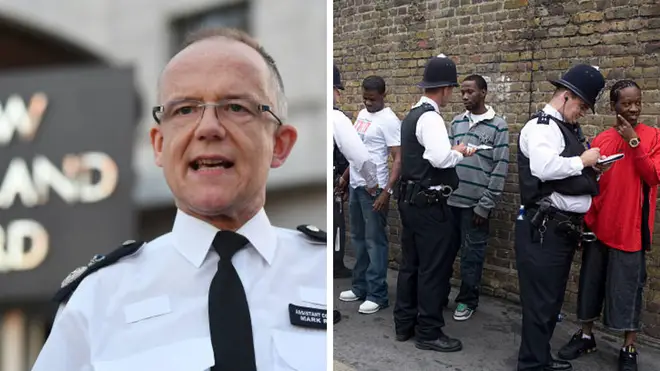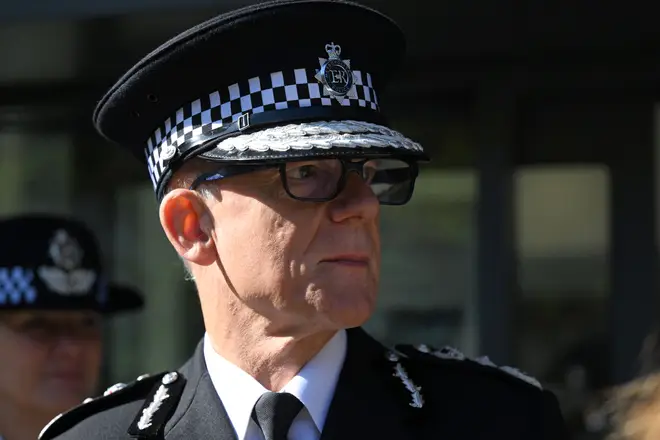
Shelagh Fogarty 1pm - 4pm
1 December 2022, 23:43 | Updated: 2 December 2022, 05:45

Young black men are twelve times more likely to be murdered than their white counterparts, according to London's top police officer, who is looking to reform the force while tackling the capital's violent crime problem.
Speaking to the London Assembly on Thursday, Sir Mark Rowley was asked about the "disproportionate" use of police strip search powers on black people.
He pushed back, asking members to think about why "young black men are 12 times more likely to be murdered in London over the last decade than young white men".
The Metropolitan Police commissioner told the assembly's plenary meeting: "I think there's something about how we look at the crime problems policing is wrestling with.
"I've been really clear that we have some officers in the service who are racist who we need to sort out and we don't get everything right, I've been really candid about that.

"But I think it would be helpful if we also look at how crime falls very unevenly on London.
"I very rarely get questions publicly about why it is that young black men are 12 times more likely to be murdered in London over the last decade than young white men.
"We're always focusing on the police use of powers, and I'm absolutely clear we haven't always got that right, so I'm not trying to be defensive about it, but if we're to tackle the fact that black communities have the lowest trust but also the highest victimisation, we need to be prepared to talk about these issues in the round."
The Met Police has been rocked by a series of scandals over the past two years, including the rape and murder of Sarah Everard by serving officer Wayne Couzens, who has since been jailed.

Watch Again: Nick Ferrari questions Met Police Commissioner Sir Mark Rowley
Sir Mark was appointed Commissioner of the Met in September this year, replacing Dame Cressida Dick, who stepped down in April amid a growing wave of criticism.
Sir Mark told the London Assembly that public trust in the force is "dented but not broken" and his leadership team is "going after" corrupt officers. It emerged last month that hundreds of officers unfit for duty were still on the force because of convoluted dismissal processes.
He paid tribute to the work of thousands of Met officers, noting that 95 had been assaulted on duty in London over the past week alone, but added: "We also have hundreds of people in the organisation letting us down.
"We haven't been vigorous and clear enough in our leadership and culture to reduce that problem to an irreducible minimum, and we will do.
"Setting up the good officers to succeed is critical, as is taking on those who have undermined the trust of the public through their corrupting behaviour.
"They have corrupted our integrity with racism, misogyny and other toxic conduct, and we're going after them."

'Are you reassured by what you've heard in terms of Mark Rowley's aims?'
He added: "Over my first 100 days what we've been trying to do is to start to change course and illustrate some different things are possible."
As well as battling corruption in his own force, Sir Mark is also seeking to get a grip on rampant violent crime in the capital.
His comments came after of two teenagers were stabbed to death in Thamesmead, south-east London, on Saturday.
Answering questions at the Assembly alongside Sir Mark, London mayor Sadiq Khan said: "We can't not mention Charlie Bartolo and Kearne Solanke - they're the names of the two 16 year olds who lost their lives this weekend.
"The three people arrested, two are 16 and one is 15, for murder. We can't run away from that."
But the number of teenage homicides in London actually went down by 53% in the first 11 months of 2022 compared with the same period in 2021.
Mr Khan said London had "bucked the national trend".
He added: "If you were speaking with similar forces - the Greater Manchesters, the West Yorkshires, the West Midlands, they've seen nothing like the reductions that we've seen in crime. It's showing we are starting to make progress."